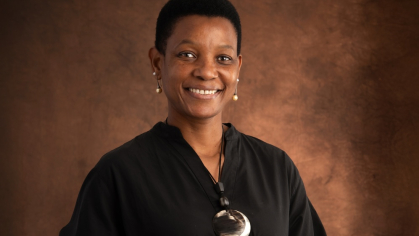Tayari Jones, Who Wrote Oprah's Latest Book Pick, Is Redefining the Southern Novel
Tayari Jones is no stranger to accolades, but her latest novel, An American Marriage, which debuted at No. 2 on The New York Times best-seller list, has brought her recognition beyond her wildest expectations. The latest in a string of great reviews and endorsements is Oprah Winfrey, who recently blessed Jones by choosing her novel as a coveted Oprah’s Book Club selection, saying it “redefines the traditional American love story.”
The novel, published by Algonquin Books, follows Atlanta newlyweds Roy and Celestial, a business executive and an artist. When Roy is falsely accused of a crime and imprisoned, Celestial begins spending time with an old friend who served as her husband's best man at their wedding. After five years, Roy’s conviction is suddenly overturned, and he returns to Atlanta ready to resume their life together.
Jones, an associate professor of English at Rutgers University-Newark, didn’t set out to tell a love story. She wanted to write a novel about mass incarceration – and spent six years researching the topic.
“The specter of wrongful incarceration is something that just kind of looms in the consciousness of black America, like hurricanes in Florida or earthquakes in California,” says Jones, who teaches in the master of fine arts creative writing program at Rutgers-Newark.
But she couldn’t find the story until she overheard a couple arguing in the mall.
“The woman said to the man, ‘Roy, you know you wouldn't have waited on me for seven years.’ And he replied, ‘I don't know what you're even talking about; this wouldn't have happened to you in the first place.’ And I thought: they're both right.”
That’s when she knew she had a good story. “To me, a novel is about a question. It’s about ambiguity,” she says. Ultimately, she says, the story is about the expectations of marriage. She initially wrote An American Marriageentirely from the wife’s point of view but then realized that the story needed Roy’s point of view to feel complete.
“When there is someone in the story who is under great trauma, like lack of food or shelter or freedom, the other person’s story doesn’t have the teeth to compete,” she says.
Jones is the author of four critically acclaimed novels. Her work has appeared in The New York Times, Poets & Writers, McSweeney’s and other publications. She has received fellowships from The National Endowment for the Arts an d The United States Artists Foundation, and she was a Radcliffe Institute fellow at Harvard from 2011-12, where she spent time researching mass incarceration for An American Marriage. In 2012 The Congressional Black Caucus Foundation, Inc. recognized Jones with its Lifetime Achievement Award in the Fine Arts for her “brilliant literary contributions.”
In January, she was inducted into the 2018 class of the Georgia Writers Hall of Fame, which she says she particularly appreciated, calling it one of her missions to make people think about Southern writing as a modern phenomenon.
“We have lots of Southern writers and they're writing and publishing and thriving,” she says. “But the American imagination has us frozen in time.” But, she adds, Southern writers are a very diverse group that don’t fit neatly into any one particular experience.”
Georgia, and Atlanta in particular, loom large in Jones’s writing – all her novels thus far have been set there.
“Georgia’s on my mind,” says the author, who was born and raised in Atlanta, and is a proud Spelman College alumna.
Jones is already thinking about her next book, which springs from an idea she has wanted to turn into prose her entire career. She hints that this time it will involve a quartet, but that it, too, will fit into her larger themes of the black family experience in the South.
Jones, who enjoys mentoring her writing students, has some advice for aspiring authors: ignore the conventional wisdom. “When people say that you have to write every day, it makes those who don't live lives of leisure feel that they cannot get their story out, and, as a result, it encourages the production of a literature written by people who have time on their hands.
“Even if you don't write every day, if you write often, you will get your book done,” Jones says. “So many important stories are in the hearts and minds of very busy people.”


